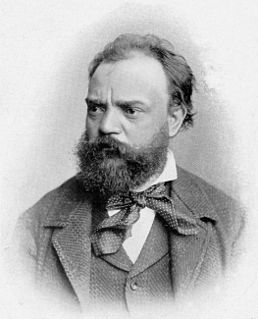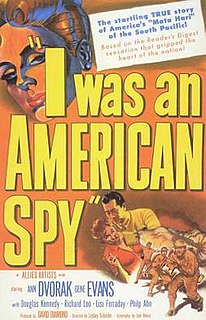
Isaac Stern was an American violinist.

The Symphony No. 9 in E minor, "From the New World", Op. 95, B. 178, popularly known as the New World Symphony, was composed by Antonín Dvořák in 1893 while he was the director of the National Conservatory of Music of America from 1892 to 1895. It has been described as one of the most popular of all symphonies. In older literature and recordings, this symphony was – as for its first publication – numbered as Symphony No. 5. Astronaut Neil Armstrong took a tape recording of the New World Symphony along during the Apollo 11 mission, the first Moon landing, in 1969. The symphony was completed in the building that now houses the Bily Clocks Museum.

Antonín Leopold Dvořák was a Czech composer, one of the first to achieve worldwide recognition. Following the Romantic-era nationalist example of his predecessor Bedřich Smetana, Dvořák frequently employed rhythms and other aspects of the folk music of Moravia and his native Bohemia. Dvořák's own style has been described as "the fullest recreation of a national idiom with that of the symphonic tradition, absorbing folk influences and finding effective ways of using them".

Rusalka, Op. 114, is an opera by Antonín Dvořák. The Czech libretto was written by the poet Jaroslav Kvapil (1868–1950) based on the fairy tales of Karel Jaromír Erben and Božena Němcová. A rusalka is a water sprite from Slavic mythology, usually inhabiting a lake or river. Rusalka was the ninth opera Dvořák composed. It is one of the most successful Czech operas, and represents a cornerstone of the repertoire of Czech opera houses.

Ann Dvorak was an American stage and film actress.

G-flat major is a major scale based on G♭, consisting of the pitches G♭, A♭, B♭, C♭, D♭, E♭, and F. Its key signature has six flats.

Three on a Match is a 1932 American pre-Code crime drama released by Warner Bros. The film was directed by Mervyn LeRoy and stars Joan Blondell, Warren William, Ann Dvorak and Bette Davis. The film also features Lyle Talbot, Humphrey Bogart, Allen Jenkins and Edward Arnold.
Humoresque is a genre of Romantic music characterized by pieces with fanciful humor in the sense of mood rather than wit.

Humoresque is a 1946 American melodrama film by Warner Bros. starring Joan Crawford and John Garfield in an older woman/younger man tale about a violinist and his patroness. The screenplay by Clifford Odets and Zachary Gold was based upon the 1919 short story "Humoresque" by Fannie Hurst, which previously was made into a film in 1920. Humoresque was directed by Jean Negulesco and produced by Jerry Wald.
Humoresques, Op. 101, is a piano cycle by the Czech composer Antonín Dvořák, written during the summer of 1894. One writer says "the seventh Humoresque is probably the most famous small piano work ever written after Beethoven's Für Elise."
Dvořák or Dvorak is a common Czech surname, originally referring to a servant or an official of manorial estate or royal court. It is the fourth most common surname in the Czech lands.

Dvorak is a keyboard layout for English patented in 1936 by August Dvorak and his brother-in-law, William Dealey as a faster and more ergonomic alternative to the QWERTY layout. Dvorak proponents claim that it requires less finger motion and as a result reduces errors, increases typing speed, reduces repetitive strain injuries, or is simply more comfortable than QWERTY.

Robert Joseph "Bobby" Connelly was an American child actor of silent films. He is one of the first male child stars of American motion pictures beginning his career in 1913 at the age of four.

Zlatni Dečaci were a former Yugoslav rock band from Belgrade, notable as one of the pioneers of the former Yugoslav rock scene.

Humoresque is a 1920 American silent drama film produced by Cosmopolitan Productions, released by Famous Players-Lasky and Paramount Pictures, and was directed by Frank Borzage from a 1919 short story by Fannie Hurst and script or scenario by Frances Marion.
Mickey's Choo-Choo is a 1929 Mickey Mouse short animated film released by Celebrity Pictures, as part of the Mickey Mouse film series. Ub Iwerks was the animator. It was the eleventh Mickey Mouse short to be produced, the eighth of that year, and was one of the series of early Disney cartoons that led Mickey Mouse to become a national fad by the end of 1929. Originally in black and white, this cartoon was of the ten Mickey Mouse cartoons colorized by the Walt Disney Company in 1991.

I Was An American Spy is a 1951 film dramatizing the true story of Claire Phillips, an American of Filipino descent who spied on the Japanese during World War II and was captured, tortured, and sentenced to death before being rescued. The film, produced by Allied Artists and directed by Lesley Selander, starred Ann Dvorak in the title role. In addition to obtaining the rights to her 1947 book Manila Espionage, the filmmakers brought Phillips on as a technical adviser and she made personal appearances to promote the film, Phillips and Dvorak became good friends, with Phillips admiring Dvorak's professional dedication in this difficult role. The film begins with General Mark W. Clark paying tribute to Claire Phillips and ends with General Clark awarding her the Medal of Freedom.

Dvořák – In Love? is a 1988 documentary film about the Czech composer Antonín Dvořák and a recording of his Cello Concerto by Julian Lloyd Webber and the Czech Philharmonic which was made in the same year. The film also tells of a love affair for the composer that never was, but was the inspiration for the concerto.
Hans Lengsfelder was a composer and playwright who also wrote under the pen name(s): H.J. Lengsfelder, Harry Lenk and John Peters. He emigrated to the U.S. in 1939. He had mixed success with his Broadway musical comedies.

Dvořák in Prague: A Celebration was an 89-minute televised concert presented in Prague's Smetana Hall on 16 December 1993, in which thirteen pieces of music by Antonin Dvořák were performed by the pianist Rudolf Firkušný, the cellist Yo-Yo Ma, the violinist Itzhak Perlman, the mezzo-soprano Frederica von Stade, the Prague Philharmonic Chorus and the Boston Symphony Orchestra under the direction of Seiji Ozawa. It was produced by Sony Classical Film and Video, Czech Television and Germany's Zweites Deutsches Fernsehen in association with Pragokoncert, the Netherlands' Algemene Vereniging Radio Omroep and the United States' Public Service Broadcasting and MJI Broadcasting, and was released on Laserdisc, VHS video cassette, CD and audio cassette by Sony Classical Records and on DVD by Kultur Video.














